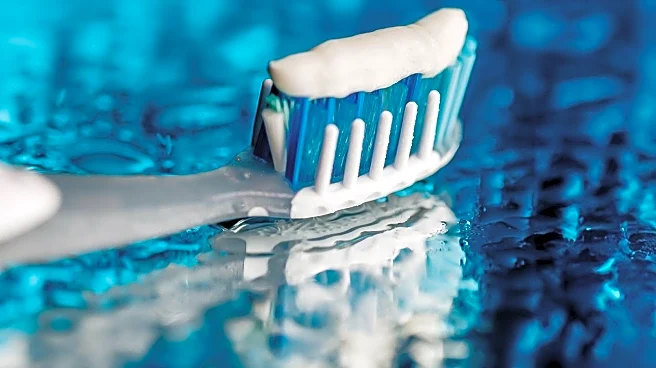What's Happening?
A study conducted by researchers from Sichuan University has established a link between rapid tooth loss and increased mortality risk among elderly individuals. The research involved tracking tooth loss in 8,073 elderly participants over an average period
of 3.5 years. The findings indicate that a faster progression of tooth loss correlates with a higher risk of all-cause mortality, regardless of the initial number of teeth. This association persists even after adjusting for various health and lifestyle factors such as age, sex, education level, drinking habits, and exercise frequency. The study suggests that tooth loss may serve as an indicator of underlying health issues that could contribute to a shortened lifespan.
Why It's Important?
The study highlights the significance of oral health as a potential predictor of overall health and longevity. Rapid tooth loss could signal other serious health problems, emphasizing the need for regular dental check-ups and good oral hygiene practices. This research could influence public health policies by encouraging healthcare professionals to monitor tooth loss progression as part of routine health assessments for the elderly. The findings also underscore the importance of addressing factors like diet, inflammation, and psychological distress, which may contribute to both tooth loss and increased mortality risk. As innovative solutions for tooth replacement continue to develop, such as lab-grown teeth and drugs that regenerate teeth, these advancements could play a crucial role in improving health outcomes for older adults.
What's Next?
The study calls for further investigation into the mechanisms linking tooth loss and mortality, with researchers suggesting that inflammation, diet, and psychological distress could be contributing factors. Healthcare professionals may begin to incorporate tooth loss monitoring into regular health assessments for the elderly, potentially leading to earlier interventions for related health issues. Additionally, advancements in dental technology, such as synthetic lab-grown teeth and regenerative drugs, are progressing and could soon offer new solutions for tooth replacement, thereby improving oral health and potentially extending lifespan.
Beyond the Headlines
The implications of this study extend beyond oral health, touching on broader issues of healthcare accessibility and preventive medicine. By recognizing tooth loss as a marker for other health conditions, there may be increased emphasis on comprehensive health monitoring and early intervention strategies. This could lead to a shift in how healthcare systems prioritize and allocate resources for elderly care, potentially improving quality of life and reducing healthcare costs associated with chronic diseases.















